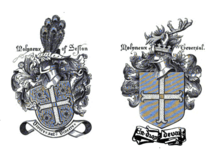Molyneux
Molyneux (/ˈmɒlɪnjuː/; Old French: De Molines or De Moulins) is a French surname. The surname has been linked primarily to a large French family that settled in Lancashire, United Kingdom from France. By the 14th century the Molyneux family had become so large that it split into three main branches; the Lancashire line, who became the Earls of Sefton, the Nottingham line, and the Calais line, from family still left over in Normandy. There was also a branch of the family who were Irish baronets.[2]
 Canting arms of Molyneux: Azure, a cross moline or | |
| Language(s) | Old French |
|---|---|
| Origin | |
| Meaning | "Moulineaux", derived from the French Moulin (meaning "mill of the waters")[1] |
| Region of origin | France |
| Other names | |
| Variant form(s) | Mullenax, Mullinax, Molinex, Mullinix, Mullenneix, Mullennix, Mullenix, Mullineaux, Molinieux, Molinaux, Molineaux, Mollineaux, Molineux, Mulling, Molyneaux |

Etymology and history
The ancestors of the Molyneaux family arrived in England in medieval time. The name "de Molines" or "de Moulins", Old French in origin, meaning "Mill", and eventually changed into "Molyneux". The early historical background of the family is sparse, coming from scattered genealogical, historical, and archaeological sources, composed of a mixture of legend, romanticized literary invention, and fact. Some historians derive the de Moulins came from Moulineaux-sur-Seine, near Rouen, in Normandy.

Other sources claim the family originally came from Moulins, France in the region of Auvergne-Rhône-Alpes. Wherever their origin, Robert de Moulins' son, William, settled in Lancashire. He had two sons William and Vivian de Moulins. Roger the Poitevin who possessed large tracts of land in Lancashire in what was then called inter Mersam et Ripam, that is, "between the Mersey and the Ribble"[3] by gift of the crown gave Molyneux large land holdings and the manors of Septon (Sefton), Thornton, Cuerden, ten carucates and a half of land, at the service of half a knight's fee. William Molyneux made Septon his chief seat and was succeeded by Vivian de Molyneux.[4][5][6]
They also held the Manor of Little Crosby, later Ince Blundell Hall, which had been held by one Uctred until 1066. By 1212 it was owned by Richard de Molyneux of Sefton before being turned over to the Blundell family. The Molyneuxs later owned most of the districts of Speke and Rainhill.[7] The Royalist gentry family held a large moated manor, a corn mill on the River Alt, and the advowson of St. Helen's Church at Sefton without interruption from about 1100 to 1700. Their successors, by then Earls, moved to Croxteth Hall.[8] Of the Sefton Molyneux family, crusaders Richard (d. 1290) and William Molyneux (d. 1320) are entombed within the church, and are its oldest inhabitants. Their effigies now lie beneath an arch moulding set into the wall in the Molyneux chapel, which is outside of the 14th-century church walls.
In 1436 the office of Hereditary Steward of the Wapentake of Salfordshire was granted to Sir Robert Molyneux of Sefton. The office was held by Sir Robert's successors (descendants of his brother Richard), the Earls of Sefton until 1972. It was the Lancashire line of the family that became the Viscounts Molyneux and later the Earls of Sefton, while there were also branches seated at Nottingham and Calais.
The senior branch of the Sefton family had been staunch Catholics and Royalists (notably in the 17th and 18th centuries) through the worst times until Charles Molyneux, 8th Viscount Molyneux, was rewarded for converting to the Protestant faith. The relatively youthful second and third Viscounts fought on the Royalist side both politically and militarily. Although Liverpool Castle had been partly dismantled in 1660–1678, Caryll Molyneux, the 3rd Viscount, had used it for storing arms. During the reign of King James II, he was outlawed by Parliament for supporting the deposed king in 1688 to 1689. Control of the Castle finally passed out of Molyneux hands after Caryll had again been suspected of participation in a Jacobite plot. William, the 7th Viscount, was a Jesuit, and there were in his time not less than seven Molyneux in the Society of Jesus alone.
Variations of the surname include "Mullinax", "Mullenax", "Molinex", "Mullinix", "Mullenneix", "Mullennix", "Mullineaux", "Molinieux", "Molinaux", "Molineaux", "Mollineaux", "Molineux", and several others.[9]
Variations
Molyneux
Notable persons with the surname Molyneux, include:
- Professor David Molyneux, Director of the Lymphatic Filariasis Support Centre, Liverpool School of Tropical Medicine
- Echlin Molyneux, Irish barrister and Professor of English Law, Dublin 1799-1886
- Edward Molyneux, fashion designer and artist, cousin of the Earl of Sefton
- Emery Molyneux, English Elizabethan maker of globes, mathematical instruments and ordnance
- Irene Molyneux, English lawn bowls competitor
- John Molyneux, British soldier
- John Molyneux, British socialist writer
- John Molyneux, of Melling, a constant confessor for the Catholic faith under Elizabeth I ; and his son and grandson, who both died in arms fighting for King Charles at Newbury
- Jon Molyneux, Managing Director Apple UK (1996-1999)
- Joyce Molyneux, British chef
- Maxine Molyneux, sociologist and feminist
- Paul Molyneux, English cricketer
- Peter Molyneux, British computer game designer
- Robert Molyneux, president of Georgetown University
- Samuel Molyneux, astronomer (son of William)
- Stefan Molyneux, Irish-born Canadian podcaster and YouTuber
- Stephen Molyneux, British educational technologist, Apple Distinguished Educator and Apple Education Mentor
- Sir Thomas Molyneux, Chancellor of the Exchequer of Ireland
- Sir Thomas Molyneux, 1st Baronet, physician, great-grandson of the earlier Sir Thomas, and brother of William
- William Molyneux, Irish natural philosopher, and father of Samuel
- Jonathan Molyneux, English turned American prisoner aboard the Loyal Margaret in 1726 who settled in Maryland and became the forefather to most American South and Midwest Molyneuxs and their different spelling variations, particularly "Mullinix". Although disputed by historians, his father was Thomas Molyneux, a disputed cadet line from the Earl of Sefton.
- Isabella Molyneux, Countess of Sefton, wife of the 1st Earl of Sefton
Viscount Molyneux
For Viscount Molyneux see Earl of Sefton, and in particular
- Richard Molyneux, 1st Viscount Molyneux (1594–1636)
- Richard Molyneux, 2nd Viscount Molyneux (1620–1654)
- Caryll Molyneux, 3rd Viscount Molyneux (1624–1699)
- William Molyneux, 7th Viscount Molyneux (1685–1759)
- Charles William Molyneux, 1st Earl of Sefton (1748–1794) previously 8th Viscount Molyneux
- William Philip Molyneux, 2nd Earl of Sefton (1772–1838)
- Charles William Molyneux, 3rd Earl of Sefton (1796–1855)
- William Philip Molyneux, 4th Earl of Sefton (1835–1897)
- Charles Molyneux, 5th Earl of Sefton (1867–1901)
- Osbert Molyneux, 6th Earl of Sefton (1871–1930)
- Hugh William Osbert Molyneux, 7th Earl of Sefton (1898–1972)
Molyneaux
Molyneaux is a rare Irish spelling variant.[10] People with this spelling variant include:
- James Molyneaux (1920–2015), Baron Molyneaux of Killead, Ulster politician
- Jerry Molyneaux, Last of the Dance Masters in County Kerry, Ireland
- Joseph W. Molyneaux, American federal judge
- Lee Molyneaux, English footballer
- Vince Molyneaux, American baseball player
Molineaux
- Tom Molineaux, African-American bare-knuckle boxer
- Othello Molineaux, Trinidadian jazz steelpan player
Molineux
- William Molineux (1717–1774), American, participant in the Boston Tea Party
- Sophie Molineux (born 1998), Australian cricketer
Mollineux
- Mary Mollineux, 17th century poet
- Joshua Mollineux, 18th century painter, for James Stanley, 10th Earl of Derby
Mullinix
American spelling variation descended from Jonathan Molyneux
- Tadd Mullinix, Ann Arbor, Michigan-based musician, descendant of Jonathan Molyneux
- Henry M. Mullinnix, an aviator and Admiral of the United States Navy during World War II
- Siri Mullinix, American Soccer Goal Keeper
Mullinax
American spelling variation descended from Richard Mullinix
- Trey Mullinax, Birmingham, PGA golfer
Other
Other persons bearing the name Molyneux :
- Lord Henry Howard-Molyneux-Howard, brother of 12th Duke of Norfolk, served as Deputy Earl Marshal of England
- Molyneux Shuldham, 1st Baron Shuldham (c. 1717 – 30 September 1798), naval officer and colonial governor of Newfoundland
References
- "International Molyneux Family Association". Mx-world.org. Retrieved 2016-04-09.
- "International Molyneux Family Association". Mx-world.org. Retrieved 2016-04-09.
- Morris, John (ed.) (1978). Domesday Book:Cheshire. Phillimore & Co. pp. R1:1–45.CS1 maint: extra text: authors list (link)
- Edward Kimber and Richard Johnson, The Baronetage of England: Containing A Genealogical and Historical Account of all the English Baronetts Now Existing, Vol. I, Published 1771, Printed for G. Woodfall, and others pp. 59–60
- Edward Kimber, The Peerage of Ireland, Vol. II, Published by Printed for J. Almon, London, 1768, pp. 26–31
- Molyneux, Nellie Zada Rice (1904) History, Genealogical and Biographical, of the Molyneux Families. Syracuse, N.Y., C. W. Bardeen. p. 9
- Moss, John. "Old Historic Families of Manchester, Cheshire and Lancashire 7". Manchester2002-uk.com. Archived from the original on 2016-04-13. Retrieved 2016-04-09.
- Sefton Historic Settlement Study Archived 2014-03-27 at the Wayback Machine. Merseyside Historic Characterisation Project, Museum of Liverpool (December 2011)
- International Molyneux Family Association.
- "Surnames Database:Molyneaux". Surnamedb.com. Retrieved 2016-04-09.
See also
- Molyneux Baronets
- Molineux (disambiguation)
- Moulineaux
- "My Kinsman, Major Molineux", short story by American author Nathaniel Hawthorne.